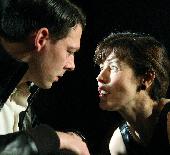SITE GUIDE
SEARCH
REVIEWS
REVIEW ARCHIVES
ADVERTISING AT CURTAINUP
FEATURES
NEWS
Etcetera and
Short Term Listings
LISTINGS
Broadway
Off-Broadway
NYC Restaurants
BOOKS and CDs
OTHER PLACES
Berkshires
London
California
New Jersey
DC
Philadelphia
Elsewhere
QUOTES
TKTS
PLAYWRIGHTS' ALBUMS
LETTERS TO EDITOR
FILM
LINKS
MISCELLANEOUS
Free Updates
Masthead
Writing for Us
A CurtainUp  London Review
London Review
 London Review
London ReviewThe Lover/ The Collection
|
Frankness at all costs: essential to a happy marriage. Don't you agree?—Richard
|

Richard Coyle as Richard and Gina McKee and Sarah in The Lover
(Photo: Alistair Muir) |
Jamie Lloyd, who recently directed The Caretaker with a production which elicited previously unseen sympathetic depths within Pinter's bleakness, is certainly well-qualified to tackle these lesser-known plays, even if the material isn't quite of the same calibre. Dark power games, adultery, menacing comedy, deceit, fantasy and desire all feature in both— making them a suitable companion piece.
The Lover has a fairly simple premise exploring role-playing within the marital state. At first, there is much comedy from the juxtaposition of a well-to-do, thoroughly respectable married couple openly discussing their ongoing infidelity. Then, as the façade of easy-going, frank acceptance starts to crumble, there is the revelation that their adultery is pure fantasy and enacted with each other. Onstage, however, there is a clever ambiguity as to whether it is the actor or the character playing two parts: that of the husband and the lover.
Richard Coyle skilfully portrays the beginnings of fractured trust in his suited husband and Gina McKee has fabulous poise as his wife. The amazing Vivienne Merchant created the female roles in her husband Harold Pinter's plays and Gina McKee has something of her enigmatic quality. Obviously, this sort of scenario must have been vastly shocking when it first aired in 1963, although now it is difficult to see much quality beyond this historically avant-garde immorality.
With a similar emphasis on deception, infidelity and mistrust, the crux of The Collection centres around whether a woman has or has not been unfaithful to her husband. While the truth remains impenetrable, this act of supposed adultery unleashes a nexus of attraction and possession. Sinister relationship and power dynamics abound as Max (Richard Coyle) embarks on a persistent course of stalking after his wife's (Gina McKee) apparent confession. Timothy West as the well-to-do Harry is a territorial, charismatic sponsor of his protégé: the young, handsome if morally somewhat dubious Bill, played by Charlie Cox in an impressive West End debut. The modish 1960s set design by Soutra Gilmour simultaneously accommodates both the well-to-do Belgravia mansion and the more bohemian flat and cleverly alludes to the interconnectedness of the two couples.
Although these two short pieces make interesting curios, they are ultimately slightly unsatisfying, trifling and flimsy. The comedy and menace convince to a certain degree, but there is simply not enough depth to the situations and characters for significant emotional investment. No longer risqué, there little left to recommend the writing, except the fact that it bears Pinter's name. Although the production and cast were near-flawless, it is a shame that they had nothing of more substance to tackle.
|
THE LOVER / THE COLLECTION
Written by Harold Pinter Directed by Jamie Lloyd With: Richard Coyle, Gina McKee, Timothy West, Charlie Cox Set Designer: Soutra Gilmour Lighting Designer: Jon Clark Music and Sound Designers: Ben and Max Ringham Running time: Two hours and 15 minutes with one interval Box Office: 0207 060 6637 Booking to 3rd May 2008 Reviewed by Charlotte Loveridge based on 30th January performance at the Comedy Theatre, Panton Street, London SW1Y 4DN (Tube: Leicester Square) |
|
London Theatre Tickets Lion King Tickets Billy Elliot Tickets Mary Poppins Tickets Mamma Mia Tickets We Will Rock You Tickets Theatre Tickets |




